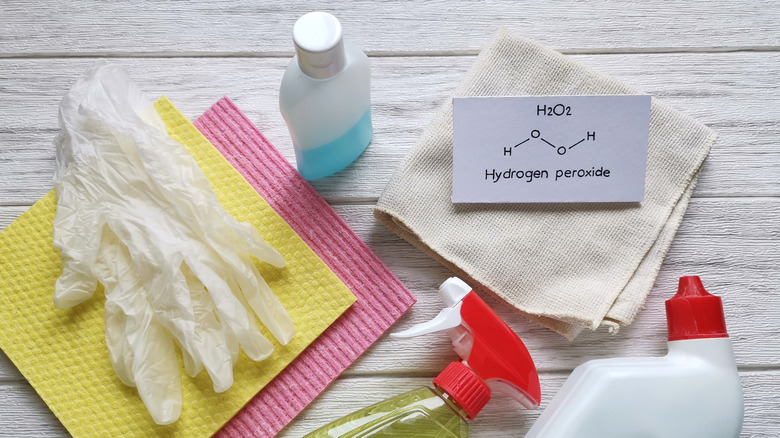This Liquid Home Essential Will Leave Your Windows Sparkling Clean
Instead of spending money on an expensive window cleaner and bringing a toxic chemical into your home, you may have the perfect liquid already available to tackle dirty windows. That's hydrogen peroxide. Commonly used to clean wounds, it's helpful in a number of ways, including working as a disinfectant (that's great for those dirty handprints from the kids) and gunk remover. If you're looking for a window cleaning solution that's homemade and works well without having to find specialty soaps or ingredients, start with this product.
Hydrogen peroxide is a type of mild antiseptic often used for cleaning away dirt and debris from wounds or working as a treatment for cold sores and gingivitis. However, what makes it helpful in these situations — along with window cleaning — is its oxidative method. When applied to a surface, the liquid reacts to the oxygen in the air, causing a foaming, bubbly effect that's eating away at the organic material on the surface of the window, allowing you to wipe it free.
Generally, hydrogen peroxide is considered a safe product, not exposing risk to most people, but toxicity can occur in high concentrations. Make sure you wear gloves when using it to safeguard your skin from damage as a result. It also has a strong odor, which isn't problematic unless in high concentrations in enclosed spaces.
Why make the switch to hydrogen peroxide?
There are a number of reasons to consider using this home essential for cleaning your windows rather than the Windex or other chemical-laden window cleaners you may be using now. First, it's inexpensive, costing around $.22 to $.94 per fluid ounce. Windex is comparable, costing about $0.35 to $1.15 per fluid ounce. Product brands and retail rates may differ. While comparable, hydrogen peroxide still comes out on top with its multiple uses.
Cost is just one benefit. Another is that hydrogen peroxide does not contain harsh chemicals. In its pure form, it has the same chemical makeup as water with one extra hydrogen molecule, making it an oxidating agent. Glass cleaners have various chemicals in them. For example, Windex contains ammonia, which can be toxic when high exposure occurs. That could make you think twice about cleaning with Windex, but there are other concerns, too. It also contains sodium dodecyl benzene sulfonate, lauryl dimethyl amine oxide, and isopropanolamine, all of which are cleaning agent chemicals that could be bothersome to the health of sensitive people.
Putting all of that aside, consider that if you want a streak-free shine on your windows and don't want to make a special trip to the store to purchase a glass cleaning agent, head to your bathroom medicine cabinet instead for something you probably have on hand. It's great as a last-minute solution, too.
How to use hydrogen peroxide to clean windows
When you're ready to make the switch to a homemade window cleaning method, let hydrogen peroxide be your first choice. You can use it on windows, mirrors, and most other glass-based surfaces. Hydrogen peroxide can have a slight bleaching effect, though, which means you'll want to color-test it on a hidden corner of anything that could be at risk.
Using hydrogen peroxide for this purpose is rather easy to do. You can test the strength based on the surface you're cleaning. Consider mixing about ½ to ¾ of a cup of hydrogen peroxide to about 32 ounces of water. Look specifically for 3% hydrogen peroxide products. If you need a bit more cleaning power, such as for caked-on material or greasy windows, add a couple of drops of mild dish detergent to this.
The hydrogen peroxide window cleaning method works on most surfaces right away, allowing you to wipe off the liquid to shine the surface. However, it may not be as effective as harsher chemicals on really thick or greasy residues or surfaces that have a buildup of material on them. In these situations, though, you can spray the hydrogen peroxide window cleaning mix onto the surface and allow it to sit in place for several minutes. That gives it more time to break down the material, allowing you to clean the surface a bit easier.


